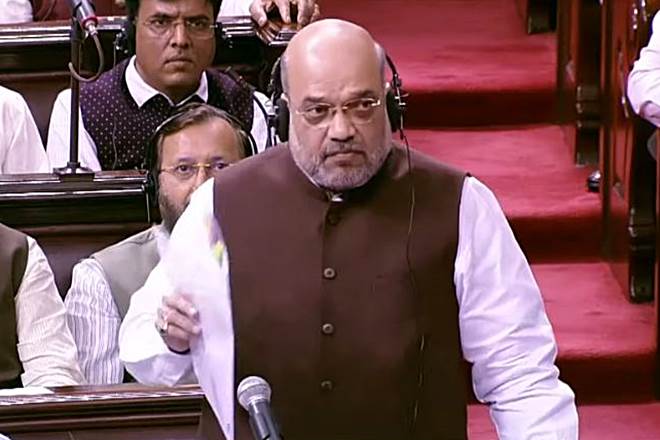
- Article 368 of the Constitution of India is titled ‘Power of Parliament to amend the Constitution and procedure thereof’. Clauses 1 and 2 of the same state:
“Notwithstanding anything in this Constitution, Parliament may in exercise of its constituent power amend by way of addition, variation or repeal any provision of this Constitution in accordance with the procedure laid down in this article
(2) An amendment of this Constitution may be initiated only by the introduction of a Bill for the purpose in either House of Parliament, and when the Bill is passed in each House by a majority of the total membership of that House present and voting, it shall be presented to the President who shall give his assent to the Bill and thereupon the Constitution shall stand amended in accordance with the terms of the Bill: Provided that if such amendment seeks to make any change in
(a) Article 54, Article 55, Article 73, Article 162 or Article 241, or
(b) Chapter IV of Part V, Chapter V of Part VI, or Chapter I of Part XI, or
(c)any of the Lists in the Seventh Schedule, or
(d)the representation of States in Parliament, or
(e) the provisions of this article, the amendment shall also require to be ratified by the Legislature of not less than one half of the States by resolution to that effect passed by those Legislatures before the Bill making provision for such amendment is presented to the President for assent.”
Queries: (a) Can a Constitutional Amendment to any Article of the Constitution (including Article 367) be made without following the above mentioned procedure?
(b) With the existence of Clause 2(d) above, if the representation of any state in the Parliament undergoes a change (for example, in case a state is converted to a Union Territory and its representation in Parliament is thus effected), can it be done without following the Clause (e) as mentioned above?
- Article 370 of the Indian Constitution (prior to the proposed changes) which is titled ‘Temporary provisions with respect to the State of Jammu and Kashmir’ states:
“Notwithstanding anything in this Constitution,
(a)the provisions of Article 238 shall not apply in relation to the State of Jammu and Kashmir;
(b)the power of Parliament to make laws for the said State shall be limited to
(i) those matters in the Union List and the Concurrent List which, in consultation with the Government of the State, are declared by the President to correspond to matters specified in the Instrument of Accession governing the accession of the State to the Dominion of India as the matters with respect to which the Dominion Legislature may make laws for that State; and
(ii) such other matters in the said Lists as, with the concurrence of the Government of the State, the President may by order specify Explanation For the purposes of this article, the Government of the State means the person for the time being recognized by the President as the Maharaja of Jammu and Kashmir acting on the advice of the Council of Ministers for the time being in office under the Maharajas Proclamation dated the fifth day of March, 1948;
(c)the provisions of Article 1 and of this article shall apply in relation to that State;
(d) such of the other provisions of this Constitution shall apply in relation to that State subject to such exceptions and modifications as the President may by order specify: Provided that no such order which relates to the matters specified in the Instrument of Accession of the State referred to in paragraph (i) of sub clause (b) shall be issued except in consultation with the Government of the State: Provided further that no such order which relates to matters other than those referred to in the last preceding proviso shall be issued except with the concurrence of that Government
(2) If the concurrence of the Government of the State referred to in paragraph (ii) of sub clause (b) of clause (1) or in the second proviso to sub clause (d) of that clause be given before the Constituent Assembly for the purpose of framing the Constitution of the State is convened, it shall be placed before such Assembly for such decision as it may take thereon
(3) Notwithstanding anything in the foregoing provisions of this article, the President may, by public notification, declare that this article shall cease to be operative or shall be operative only with such exceptions and modifications and from such date as he may specify: Provided that the recommendation of the Constituent Assembly of the State referred to in clause (2) shall be necessary before the President issues such a notification.”
Queries: (a) Can ‘Constituent Assembly’ mentioned in Clause (3) above be replaced by addition of a clause to Article 367?
(b) No provision of the above mentioned Article exclude the application of provisions of Article 368 in relation to any amendments to be brought to Article 370. It is only stipulated that Article 238 shall not be applicable. In this context again, can changes to Article 370 be brought by changes to Article 367 and by not following Article 368?
(c) Can ‘President’ or ‘Central Government’ or even ‘Parliament’ equate ‘legislative assembly of the state’ in the context of the State of Jammu and Kashmir? Is it intra-vires the ‘mens-rea’ principle (the intent or spirit of the original Act – which is a prime consideration during legal and judicial interpretations)?
Nivedita Dwivedi is an educationalist
SIGN UP FOR COUNTERCURRENTS DAILY NEWS LETTER







































